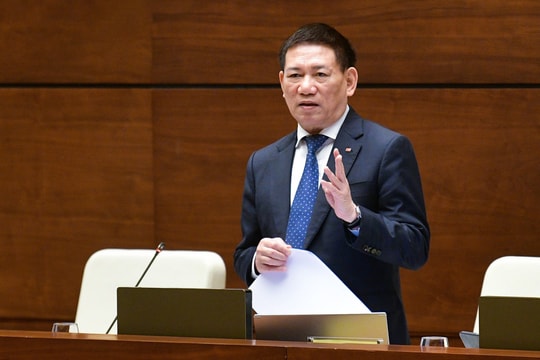Increased assets and income of unexplained origin: Taxation is correct!
(Baonghean.vn) - On June 13, the National Assembly discussed in the Hall the draft Law on Anti-Corruption (amended). Regarding this draft Law, according to National Assembly member of Nghe An province Nguyen Huu Cau, it is correct to tax assets and income that increase without reasonable explanation of their origin.
 |
| Delegate Nguyen Huu Cau. Photo: Diep Anh |
To handle assets and income declared dishonestly, and assets and income increased without reasonable explanation, the draft Law has proposed two options.
Option 1 stipulates that the agency or unit controlling assets and income shall request the tax authority to collect personal income tax. At the same time, the draft Law amending the Law on Personal Income Tax stipulates a tax rate of 45% for income declared dishonestly by those who are obliged to declare.
Option 2 stipulates that the agency or unit controlling assets and income shall request the competent authority to issue a decision to impose an administrative penalty with a fine equal to 45% of the value of the asset or income difference or increase whose origin cannot be reasonably explained.
There are still many different opinions on this issue. And in order to have a convincing basis for handling assets and income, some opinions say that, first of all, it is necessary to clarify in the draft Law what is considered an "unreasonable explanation".
As National Assembly Deputy Nguyen Huu Cau said, it is necessary to understand that the anti-corruption bill does not regulate the handling of unexplained assets. The law stipulates that if it is proven that the assets are obtained through corruption, or have their origin in corruption, they must be confiscated because these are assets obtained through crime.
But in reality, there is a type of property and income that is not declared or declared without a reasonable explanation of its origin, which the law, including the Anti-Corruption Law, cannot call unexplained property... Due to the customs and practices of Vietnamese people who have accumulated from generation to generation, and to protect the secrecy of their assets, some people have not declared their assets and income. Because if they declare a lot of assets, they may be stolen or robbed... Or they declare their assets and income but the explanation of their origin is not reasonable, for example, explaining that they built a house or a mansion because they sold brooms.
“Such an explanation is unreasonable, because there is no way to get a mansion from trading brooms. But that type of property, the law, including the law on anti-corruption, does not call it unexplained property,” Mr. Cau analyzed.
With the personal income tax rate ranging from 5% to 35%, the Government proposed to tax at 45%, the Director of Nghe An Provincial Police Department said that the tax plan is correct. Because paying taxes is the responsibility of each person, when assets and income are listed but not yet taxed, the Anti-Corruption Law considers them as current assets and forces them to pay taxes to the State.
“This taxation does not eliminate future responsibilities. If later, state agencies prove that the assets were obtained through crime, they will continue to confiscate and seize more,” the delegate emphasized.
The key here is who will verify and prove the assets and income of an official to determine whether they are illegal? National Assembly member Nguyen Huu Cau analyzed: The plan to punish administrative violations with a fine equal to 45% of the value of the assets, income difference or increase without reasonable explanation of the origin is unreasonable.
In fact, if administrative sanctions are applied, the responsibility for proof still belongs to the State agency. Because, if there is a violation, then administrative sanctions will be applied. But here, it has not been proven whether there is a violation of the law or not?
“If the State can prove that the property is the result of crime, or corruption, or has its origin in corruption, it must definitely confiscate it. The Penal Code and the Criminal Procedure Code have already regulated this issue. At that time, it will no longer be a matter of taxation,” Colonel Cau stated.


